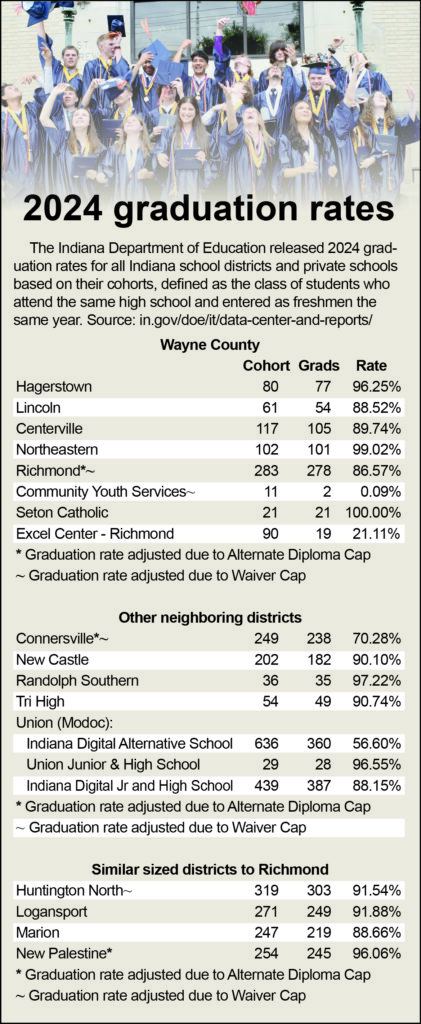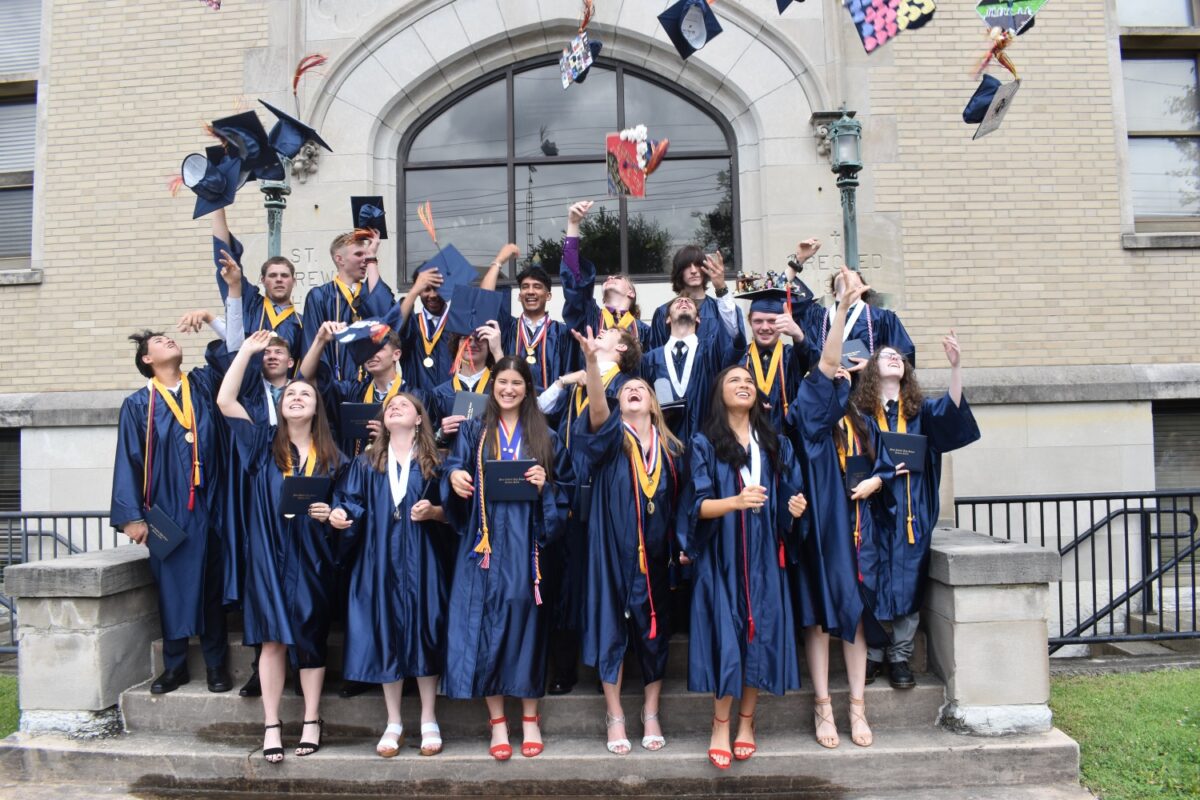Nearly all Wayne County high schools neared or exceeded a 90% graduation rate for the Class of 2024.
Three local schools surpassed Indiana’s average of 90.23%, which is the highest graduation rate since state officials began publishing data. Indiana’s rate was 88.98% in 2023.
Centerville Senior High School Principal Brian Bellew said rates can vary widely from one graduating class to the next for many reasons.
“Today’s students are faced with a lot of pressures and factors that can be hurdles to graduating,” Bellew said. “These include academic challenges, issues at home, socioeconomic reasons, mental health challenges, etc. Combine this with the distractions of today’s modern world such as social media, and our students face a difficult road. However, it is our job to bridge that gap between outside influences and success in school to ensure we provide the best possible educational environment we can and to ensure as many kids as possible graduate.”

Results at a glance
State officials measure the results of a graduating class, called a cohort, of students from their first day of high school to graduation four years later.
For instance, students needing an extra year of instruction count against their class data, even if they eventually earn diplomas. Students who move away and can’t be tracked also negatively affect their former school’s rate.
One local school earned a perfect score. All 21 seniors finished on time at Seton Catholic, a private school in Richmond.
Northeastern led the county’s public schools with 101 of its 102 seniors (99.02%) completing studies.
The Knights were followed by Hagerstown (96.25%), Centerville (89.74%), Lincoln (88.52%) and Richmond (86.57%).
Richmond’s rate was reduced by state caps on alternate diplomas and waivers. RHS principal Rae Ferriell-Woolpy said the school’s graduation rate was 95.24% without the waiver caps that state officials implemented in 2024.
Another Richmond Community Schools program, Community Youth Services at Baxter, shows a 9.09% graduation rate. Two of 11 seniors graduated with their class. CYS serves students needing a more restrictive or alternative type of educational setting.
According to the Kids Count Data Center, nearly 25% of RCS’ student population in 2021 qualified for special education (1,064 of 4,574).
Western Wayne News contacted the county’s five public school superintendents to gather their reactions to this year’s data. Nettle Creek didn’t respond before press time.
Lincoln
Renee Lakes, Lincoln Middle/High School principal, acknowledged the Golden Eagles’ graduation rate was not as high as Western Wayne educators would have liked.
She noted that several students who receive special education services earned a certificate of completion in 2024. Those students didn’t count as graduates, which lowered the school’s rates.
“We also had a couple of students who moved and were never enrolled in another school and even though we followed all appropriate steps they still counted against us,” Lakes said.
Indiana now allows schools to issue an alternative diploma for students with disabilities instead of a certificate, so that change will help with future graduation rates, she said.
Northeastern
Superintendent Matthew Hicks and NHS principal John Markward agreed they’re very proud of efforts by their students, teachers and teaching assistants at all grades, since many NHS graduates start and end their schooling in the district.
“This is a team effort from the earliest of ages all the way to graduation,” Markward said. “Every interaction that our staff members have is a small piece of the overall picture that makes up our graduates.”
The Knights continue to help students consider their future plans so they’re prepared for their life after graduation and are motivated to earn a diploma. Employers set diplomas as a basic bar for workforce entry, Hicks said.
Attendance is a key factor in graduation rates. NHS’ data shows that students tend to have a parallel relationship between the days they miss and their academics.
“If we get them to school, we are very good at getting them to graduate,” Hicks said.
Richmond
Indiana’s caps on waivers and alternate diplomas reduced RHS’ graduation rate by nearly nine percentage points (8.67 to be exact).
RHS principal Rae Ferriell-Woolpy said Indiana officials decided they wouldn’t count a certain percentage of the diplomas for students who received a waiver when calculating the graduation rate. Waiver caps started in 2024.
Ferriell-Woolpy said a waiver for a diploma means that a student couldn’t meet the pathway requirement. Students who receive a waiver met all coursework requirements and earned all credits required for a diploma.
If the caps weren’t a factor, RHS would show 95.24% receiving their diploma.
“We are proud of the fact that this has been the 10th consecutive year where RHS students have had over a 90% graduation rate,” Woolpy said.
Woolpy said Richmond educators constantly review data to give them information on how to improve and create new classes, opportunities and initiatives. They’re also seeking grants to help students.
One new effort to help RHS students this year is a career coach, paid for by a grant.
After RCS educators received the Federal Accountability Report for schools last fall, they’re discussing ideas for new initiatives to boost RHS’ graduation rate. One is a ninth-grade Transition to High School class to increase the initial success of all students entering RHS.
Ferriell-Woolpy said RHS isn’t immune from chronic absenteeism, which is a nationwide problem for schools.
Centerville
Bellew said Centerville Senior High School has consistently had a graduation rate higher than 90% and higher than the state average.
“While it is disappointing to see our percentage drop below this rate, we all feel confident that we will rebound and see a higher graduation rate next school year and into the future,” he said.
Centerville has been offering additional remediation and enrichment time during homeroom using online learning programs the last few school years and will continue to do so.
Teachers also have received professional development through the College Board.
Bellew said schools are still feeling the impacts of pandemic disruptions.
“Students are different than they were 5-10 years ago, and it presents different challenges to teachers and staff that we are still learning to adapt to,” Bellew said. “Attendance and making sure kids are in school consistently so that we can ensure they are learning continues to be a challenge.”
Communities in Schools
The national organization, which has an office at Central United Methodist Church, 1425 E. Main St. in Richmond, raises money to hire employees to be stationed in the county’s public schools at least a few hours per week. They help meet students’ basic needs and work with them to address academic, attendance and/or behavioral concerns.
“CIS plays an important role in providing the basic needs for students (food, shelter, a sense of belonging) in order for them to learn without the basic need worries of poverty,” said Ferriell-Woolpy.
Centerville-Abington is lucky to have a CIS representative in its buildings, Bellew said. Hayleigh Ray works with CSHS students in a variety of ways.
“When we are able to identify a student in need, she is always quick to meet with the student and connect them with the supports and services needed,” Bellew said.
Hicks said CIS has a net positive impact over the course of a Northeastern student’s career. Addressing attendance and behavior issues improves academic performance, he said.
Hicks asks the community to continue to support parents as they seek to meet their children’s needs in terms of clothes, shelter and fostering a safe environment to raise a child.
What’s next
Educators agree that employers definitely emphasize the value of a diploma, and they’re seeking partners as they adapt to upcoming state diploma changes.
Indiana’s newly approved GPS Diploma, which goes into effect next school year with the Class of 2029, emphasizes students’ employability. Schools are increasing partnerships with their local Chamber of Commerce, businesses, and companies.
Wayne County school administrators and Wayne County Area Chamber of Commerce members have begun discussing many partnership possibilities to meet the new requirements for student employment, Ferriell-Woolpy said.
Bellew said Centerville is preparing to offer students as many different opportunities as possible.
“We understand that not every student fits under the same model or umbrella. In the coming years, students will be able to better tailor their educational path to their career and personal interests,” he said.
Centerville is increasing its offerings in both dual credit (college credit bearing courses) and career-focused courses. It’s partnering with IU East School of Education to offer education courses allowing juniors and seniors to gain experience in teaching before they graduate. Another new partnership will offer training for jobs in dentistry, pharmacy, veterinary sciences and medical assisting, in addition to what CSHS already offers through Whitewater Career Center.
A version of this article appeared in the February 5 2025 print edition of the Western Wayne News.

